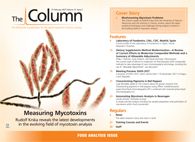Meeting Preview: RAFA 2017
A preview of RAFA 2017, which will be held 7–10 November 2017 in Prague, Czech Republic.
Photo Credit: TTstudio/Shutterstock.com

A preview of RAFA 2017, which will be held 7–10 November 2017 in Prague, Czech Republic.
The 8th International Symposium on Recent Advances in Food Analysis (RAFA 2017) will take place in Prague, Czech Republic, on 7–10 November 2017.
The RAFA organizers, the University of Chemistry and Technology, Prague (UCT Prague, Czech Republic), and RIKILT, Wageningen University & Research (The Netherlands) would like to invite food scientists from academia and industry, and representatives of national and international agencies, control authorities, governmental and commercial laboratories to attend this event.
RAFA has grown since the conference was launched in 2003. The previous two events were attended by 800 participants from more than 60 countries of Europe, Asia, America, Australia, and Africa, and supported by more than 50 sponsors, exhibitors, and media partners.
The RAFA 2017 symposium will provide an overview of contemporary trends in analytical and bioanalytical strategies in food quality and safety control and discuss challenges for novel approaches. The following recent and emerging issues will be addressed by RAFA 2017 sessions: authenticity and food fraud; bioactive compounds; flavour significant compounds; “omics” including “foodomics”; food forensics; nanoparticles in food; novel foods and supplements; organic crops and foodstuffs; QA/QC and chemometrics and data interpretation; allergens; industrial contaminants; metals and metalloids; mycotoxins, marine, and plant toxins; packaging contaminants; processing contaminants; pesticide residues; and veterinary drug residues
Workshops, Seminars, Tutorials
The conference programme will be accompanied by several satellite events alongside workshops, seminars, and tutorials on novel analytical strategies, including workshops on “Vibrational Spectroscopy and Chemometrics for the Monitoring of Food and Feed Products and Contaminants Detection” and “Analysis of Nanoparticles in Food, Cosmetics, and Consumer Products” and “Human Biomonitoring of Food”. Other sessions include “Smart Portable Food Analysis Systems and Citizen Science” and “Data Quality and Smart Data Handling in Food Analysis”. There will also be an opportunity to enhance your knowledge of mass spectrometry at the RAFA Mass Spectrometry School.
An interactive seminar will discuss “Sampleâprep, Separation Techniques, and Mass Spectrometric Detection in Food Quality and Safety: Step by Step Strategies for Fast development of Smart Analytical Methods”. The Reference Laboratories Colloquium will include a workshop on “Experiences, Achievements, and Challenges Addressed by EU Reference Laboratories”.
The Food Authorities’ Summit-EU and Beyond will include a seminar from the United States Department of Agriculture (USDA) on “Food Safety Issues Beyond the EU” as well as workshops on “Food Safety in China: Past, Present and Future” and Sustainable Food Security and Quality-Challenges for Developing Countries”. The European Food Safety Authority (EFSA) information platform on emerging food quality and safety issues of high concern will also be discussed.
An open day on food integrity will focus on the latest developments and strategies in safety, quality, authenticity, and traceability and the HORIZON 2020 session will discuss the collaboration challenges within the EU framework programme for research and innovation.
Vendor Seminar and Exhibition
Vendor seminars provide the opportunity for leading companies to introduce recent instrumentation and analytical strategies for advanced food quality and safety control. An exhibition of modern instruments, laboratory equipment, reference materials, and consumables used in food analysis will be an important part of the symposium.
Young Scientist Opportunities
A platform for young scientists will be offered to present their scientific work; typically 20% of the contributed oral presentations is assigned to the next generation. Also a number of RAFA 2017 Student Travel Grants will be provided. The best poster presentation(s) by a young scientist(s) will be awarded with the prestigious RAFA Poster Award and sponsored poster award(s).
In summary, RAFA 2017 will offer a highâquality scientific programme with topâquality presentations followed by stimulating discussions, a series of satellite events, a large state-of-the-art exhibition, and an attractive social programme. Scientific contributions will be presented by leading scientists through keynote lectures and by contributed oral and poster presentations. The RAFA 2017 programme will be tailored to provide a lot of opportunities for networking as well as exploration of the latest results of the food analysis community.
Deadline for submission of an abstract for oral presentation is 15 July 2017; deadline for registration at a reduced fee is 31 July 2017; and deadline for submission of an abstract for poster presentation is 31 August 2017.
E-mail:rafa2017@vscht.cz
Website: www.rafa2017.eu

Regulatory Deadlines and Supply Chain Challenges Take Center Stage in Nitrosamine Discussion
April 10th 2025During an LCGC International peer exchange, Aloka Srinivasan, Mayank Bhanti, and Amber Burch discussed the regulatory deadlines and supply chain challenges that come with nitrosamine analysis.













